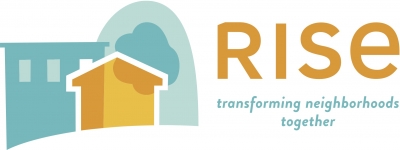Eleanor Tutt – Data Storyteller at Rise
This article is next in a series intended to help you get to know our staff and the work they do at Rise. Many people do not realize the level of expertise and commitment to community development among all of the Rise staff. These are the folks that are doing the hard and sometimes extremely complex work it takes to bring everything together necessary to lift the quality of life in our communities.
Eleanor Tutt is certainly no stranger to hard and extremely complex work at Rise. As Data Management Coordinator, Eleanor is responsible for analyzing Rise’s geospatial databases, collecting and publishing neighborhood indicator data (including building condition, demographic, social, and economic data), and creating Geographic Information System (GIS) maps for Rise planning and development projects. She provides capacity-building technical assistance services to neighborhood organizations, introducing them to data management best practices and assisting them in the development of their own maps and databases. If you have had the opportunity to spend any time at all with Eleanor, you know she is passionate about data and the power it has to shape, change and positively influence our neighborhoods and communities. I am always amazed at the breadth and depth of the work she is involved in and her ability to get people excited about data. It’s hard not to get excited when you listen to any of her presentations or get involved in a conversation with her. She makes it very clear how much she loves her job and how fortunate she is to get to do what she loves every day. If you get the opportunity to attend one of Eleanor’s presentations, don’t pass it up. You will walk away with a new perspective on data.
On any given day Eleanor could be working on anything from the Off the Charts! 2: Data and the Arts for Social Change with the Regional Arts Commission (RAC), to setting up an interactive online dashboard related to problem properties for Dutchtown South Community Corporation, to updating and working on the Neighborhood Data Gateway (a source for data on St. Louis assets and opportunities managed and maintained by Rise), to organizational work for Build for STL and the National Day of Civic Hacking. Whew! That’s a lot for anyone on any day to be working on and that is just to name a few of Eleanor’s projects.
Eleanor also serves on the Executive Committee of the National Neighborhood Indicators Partnership (NNIP) and on the Data Portal Committee of the East-West Gateway Council of Governments Regional Plan for Sustainable Development; she is a member of the St. Louis Chapter of the American Statistical Association, currently serving as its Treasurer; and is a member of InveSTL.
Eleanor has the unique ability to tell many different stories through data balanced with the ability to draw us in through her enthusiasm. Her commitment to her work and her standard of excellence are both admirable and much needed by our communities, and most certainly here at Rise. LP
Want to try to keep up with Eleanor? Good luck! Follow her @eleanortutt








